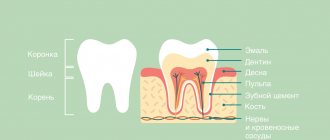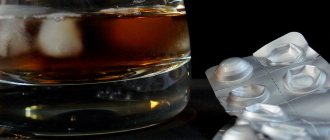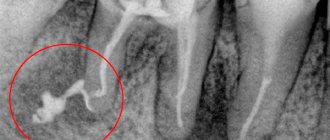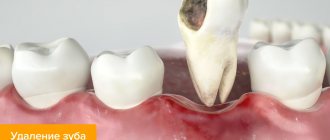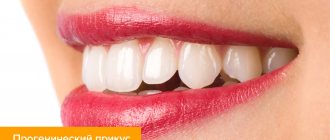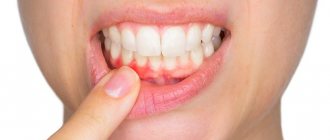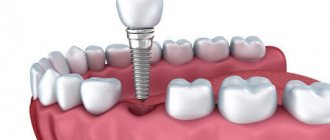A high-quality and rapid wound healing process after tooth extraction depends not only on the professionalism of the doctor who performed the extraction (removal) of the tooth, but on the correct behavior of the patient after the procedure, who must strictly follow the recommendations given by the doctor for the period of healing of the wound surface. If you correctly and clearly follow the advice of a specialist, the recovery process occurs quickly and as painlessly as possible.
For example, patients who do not listen to the recommendations given to them make rinsing movements in the area of the healing wound; this washes out the blood clot, which performs a protective function against the entry of bacteria and microbes, as a result of which there is a high risk of wound suppuration.
In this article we want to give recommendations on what should and can be done after tooth extraction, and what should not be done.
1. A gauze swab on the hole. When can it be taken out?
As a rule, the doctor does not immediately release the patient after removal, but asks him to wait for 15-20 minutes within the clinic to then examine and make sure that everything is in order with blood clotting and the tampon can be removed without fear. In rare cases, keeping the tampon in your mouth may take 30-40 minutes, usually 10-20 minutes. There is no need to keep it longer and it is even dangerous, because bacteria accumulate on it and there is a possibility of infection. There are exceptions, when the wound continues to bleed a little, then the old tampon is replaced with a new sterile one and kept for some time.
For some time, saliva may still be pinkish due to staining with secreted ichor, this should not be alarming, this situation can be distinguished from bleeding. At this moment, saliva can be easily swallowed; there is no need to accumulate it in the mouth.
How to use
All medications containing paracetamol must be taken 20 minutes after meals and washed down with plain water. For this purpose, it is not recommended to use coffee or other drinks containing caffeine, since this substance, in combination with paracetamol, has a negative effect on the liver.
When using the drug without a doctor's prescription, the maximum single dose is 1 gram. For toothache, take it up to 4 times a day.
The greatest caution should be exercised when treating children with the drug. Self-medication in this situation is contraindicated. The best solution would be to call a doctor or an ambulance to see the child.
The maximum time during which you can take paracetamol is 3 days. In addition, it is generally prohibited for children under three years of age.
When calling a doctor, you need to tell him about the presence of chronic diseases and medications currently taken. No significant interactions of paracetamol with other drugs were found, but it is safer not to take the drug simultaneously with sodium valproate and sodium barbiturates.
2. After what time can you eat and drink?
After removal, you can drink water. After two hours you can eat. The limiting condition is not to chew rough food on the side of the extracted tooth in the first few days. Hard food can damage the blood clot, which is located in the socket and is needed for wound healing. If the patient experiences an acute feeling of hunger, then no one forbids eating cool yogurt or kefir. In the first days of healing of the hole, it is better to completely avoid eating rough, hard, solid foods, so as not to make strong chewing movements, as well as spicy, salty foods, so as not to irritate the oral mucosa. It is also important to monitor the temperature of food and drinks; they should not be too hot.
Paracetamol as a remedy for toothache
The international name of the drug is acetaminophen. For several decades, paracetamol has been used both in the CIS and in other countries.
Some medicines based on paracetamol:
- "Paracet"
- "Calpol"
- "Panadol"
- "Tylenol"
- "Efferalgan"
- "Opradol"
- "Akamol"
- "Mexalen"
- "Volpan"
Various forms of paracetamol packages can be found in pharmacies for free sale.
The forms of release of drugs based on paracetamol are also very diverse: ordinary tablets, capsules, ampoules, elixirs, syrup. The product is available at literally any pharmacy without a prescription. This method of dispensing gives people the erroneous illusion that the medicine is completely safe for health.
3.Applying ice.
After tooth extraction in our Center, a specialist will give you ice specially prepared for such procedures to apply in the first hours after extraction. Ice is applied for a certain time, at certain intervals, which the doctor will instruct you about. At home, this procedure will need to be continued for some time (the first few hours after removal). This is done in order to minimize or completely eliminate tissue swelling.
Under no circumstances should you heat the area in the area of the extracted tooth; in this case, suppuration will develop.
6. Medications after removal.
After the procedure, the doctor prescribes a number of medications to take. Under no circumstances should you take any medications on your own, without consulting a doctor.
Painkillers should be taken in case of pain, at intervals and in the amount recommended by the doctor. Each case is individual; it happens that the patient does without taking painkillers.
Antibiotics. In some cases, after removal, antibiotics are prescribed for 5-7 days. As a rule, these are situations when the doctor removes a tooth in the stage of inflammation, complex extraction or removal of several units of teeth. Only a specialist surgeon decides whether to take antibiotics or not.
Antihistamines. Reduces the likelihood of swelling.
Antiseptics. Used as a rinse. BUT, remembering that rinsing movements are prohibited in the first days. A small amount of solution is taken into the mouth and simply held in the mouth, then calmly spit out. Such baths must be done if the tooth was removed during the inflammation phase, if the flux was exposed, if there are teeth affected by caries in the oral cavity.
When to see a doctor
Contact your healthcare provider if you experience the following symptoms:
- pain that does not decrease/increase on the 3rd day after surgery,
- numbness persists for 2 days after surgery, does not go away a week after implantation and only intensifies, spreading over the entire face,
- a sharp increase in facial swelling on the 2-3rd day or after it has already subsided,
- a sharp increase in body temperature or it does not subside 3-4 days after surgery,
- when pressing on the implants, unpleasant sensations, sharp pain occur,
- the seams came apart
- redness of the gums and bleeding that does not stop after 2-3 hours,
- discomfort and sharp pain when pressing on the area of installed implants 7 days after installation,
- pain after fixing the prosthesis, teeth do not close together, it is impossible to chew even soft food,
- The prosthesis became mobile and some of the teeth chipped.
7.High blood pressure.
In patients with high blood pressure, there is a risk that the wound may bleed longer than usual. In this case, you need to regulate the pressure by taking appropriate medications to reduce it. In our SDent dental medical center, even before the start of manipulations, the doctor always finds out the main points about the general health of the patient. If the patient has hypertension, the specialist knows about this problem in advance and then gives the necessary recommendations appropriate to the case.
If you have dental implants, it is prohibited
- use electric toothbrushes, since vibrations and excessive pressure during the cleaning process, especially in the first months after implantation, can lead to poor fixation of implants,
- You should also not use dental floss, especially if only a few implants were installed to replace living teeth. After implantation, the gums become less sensitive and when flossing you may not feel when it is time to stop - this can damage the tissue, which will lead to bacteria getting into the area around the installed implants. And this is already fraught with their possible rejection,
- carry out hygienic cleaning in any dentistry - it is very important that the hygienist knows how and understands how to carry out the procedure in the presence of dental implants,
- Eating foods that are too hard: The denture can be damaged if you bite off hard objects with your teeth, chew pencils, or crack open nuts. Of course, it can be restored, but it is better to prevent such situations from developing.
You will forget about dental problems for the rest of your life! Together with you, we will select the most optimal implantation method and give it a LIFETIME guarantee.
Free consultation
8.What happens to the sutures after removal.
After the tooth is removed, the surgeon places sutures on the wound surface. This promotes faster healing, reduced pain, less risk of inflammation, minimizes the risk of bleeding, and protects the blood clot from falling out.
At the SDent clinic we use the most modern and safe materials. The thread with which the surgeon sews the edges of the hole is self-absorbing. But during the process, the ends of the thread can cause discomfort to the patient and interfere with the oral cavity. Therefore, for the comfort and safety of the patient, the doctor always sets an appointment date for examination and removal of sutures in approximately 10 days.
Frequently asked questions and answers
Don't worry: it's completely normal to feel some discomfort. But be sure to pay attention to the signals your body sends. If in doubt, contact support to find out if your symptoms are normal. Be attentive to your teeth and your body as a whole - remember that implants, the entire jaw system, and you yourself need some time for rehabilitation.
Postoperative consequences and complications
This section discusses the most popular questions about conditions that arise during or in the first days after the installation of implants. Please note that it is very important to distinguish between the concepts of “consequences” (this is the norm, since tissue injury occurs during surgery) and “complications” (they are a pathological condition that requires immediate consultation with a doctor).
During the operation, I heard the doctors and felt that they were doing something in my mouth, although without pain, but I should have been sleeping, why?
You need to understand the difference between concepts such as “sedation” and “general anesthesia.”
General anesthesia is a complete shutdown of consciousness and the patient's immersion in sleep. As a rule, it is carried out by inhalation. Breathing is provided by an artificial lung ventilation device (ALV). Therefore, when using general anesthesia, the patient does not hear or feel anything. Sedation can be xenon (superficial, essentially to calm and saturate the body’s cells with oxygen), as well as intravenous. In the second case, certain anesthetics are introduced into the body (selected individually), their dosage is calculated based on the patient’s weight, his state of health, and the duration of the procedure. If necessary, the drug can be reintroduced during surgery. At the same time, local anesthesia is used.
The Smile-at-Once Clinic has an agreement with a specialized and licensed service of professional anesthesiologists. The ambulance and the team of doctors are certified within the framework of the standards and are an ambulance substation. Therefore, treatment under general anesthesia and intravenous sedation is carried out under the strict supervision of specialized specialists.
The difference between sedation and general anesthesia is that the patient retains the ability to breathe on his own, there are no involuntary reflexes of the respiratory tract (coughing, swallowing), unlike anesthesia, the patient is conscious and can, if necessary, follow the doctor’s instructions.
Since sedation uses more gentle drugs (unlike general anesthesia), the patient does not fall asleep, but relaxes. The action is individual: someone falls asleep for several hours, someone plunges into a state of complete relaxation. If you belong to the second type, then you will really feel everything that happens in the oral cavity. But all procedures are painless, since high-quality local anesthesia is used. And the sensations remain at the level of “moving instruments” in the oral cavity.
I just returned home from implantation and my cheek started to swell. Is this normal and what can I do?
This is a normal process caused by tissue trauma during implant installation. The swelling reaches its peak on the 3rd day, after which it should gradually subside. If the situation is opposite, be sure to consult a doctor. To reduce swelling, you need to apply a cold compress for the first two hours, repeating the course throughout the day if necessary.
The wound bleeds even several hours after the operation. This is fine?
If the bleeding is minor, there is nothing to worry about. You can stop it by applying a piece of sterile gauze to the wound and closing your jaws tightly. Remember not to rinse your mouth, actively move your jaw, chew, suck or swallow forcefully - all of this can increase bleeding.
If 3-5 hours after surgery the bleeding not only does not decrease, but also intensifies, you need to consult a doctor.
Yesterday I had an operation, and today I woke up with blood on my pillow, and the bleeding appears periodically throughout the day, what should I do?
Occasional bleeding is normal up to 7 days after surgery, but usually goes away within 2-3 days. We strongly recommend sleeping in a horizontal position right away, with pillows on the sides of your head. If necessary, make a comfortable tilt angle of up to 30 degrees for yourself.
It is important to sleep strictly on your back, but if you accidentally turned your face to the side in your sleep and were in this position for a long time, then due to tissue compression, bleeding is possible, and depending on the load, even profuse bleeding. The main thing is that it stops within 1-2 hours after you take a vertical position. If the bleeding is persistent, be sure to contact Patient Services to arrange an unscheduled examination by your physician.
I feel uncomfortable in the lying position, I feel pressure in the jaw area and pulsation in my head. What to do?
Such sensations arise due to increased blood flow to the head. In this situation, try sleeping in a semi-sitting position (tilt up to 30 degrees) - use an additional pillow or place it under the mattress, increasing the inclination of the bed. This way the head will be at a higher level in relation to the body and the unpleasant sensations will subside. But it is advisable to fix your head so as not to throw it to the side.
I had bruises on my face – hematomas. Is this normal and how can I remove them?
Hematomas are a consequence of vascular injury during implant installation. They appear quite often after the installation of two-piece structures, as well as after zygomatic implants - they appear approximately 2-3 days after the operation. You have absolutely nothing to worry about - the color of the bruises will change as the tissue begins to recover. In the fight against swelling and bruises, various gels for resolving bruises, for example Badyaga Forte, will help you.
My lips are dry and have small cracks - what does this mean?
This is also a completely normal condition caused by a long stay in the dentist's chair and the lack of natural wetting of the mucous membranes. For the first two to three days, use petroleum jelly or a cream containing lanolin to relieve dry lips. A regular balm may not be enough - you need a cream that is as rich and moisturizing as possible. Also make sure you drink enough fluids.
I have increased salivation after having implants - is this normal?
Saliva is a very important biological medium for the organs and tissues of the oral cavity. It contains many enzymes that promote normal digestion and the formation of healthy oral microflora. The therapeutic norm is the production of liquid by saliva in the amount of 2 ml per ten minutes. In the case of implantation, especially during the period when the denture has not yet been installed, the patient may complain of hyperactivation of the secretory function of the salivary glands already when 5 ml is produced. This is a normal reaction to tissue injury as a result of implantation, especially if the operation was performed to restore a full row of teeth.
But increased salivation is also possible as a result of damage to the lingual nerve. Its symptoms are pain when swallowing, changes or complete loss of taste, numbness of the tongue and its biting, burning, drooling. If the integrity of the nerve is not compromised, but there is compression on the nerve or its sheath is damaged, then the unpleasant sensations are restored within a period of 7 days to 4 months. Otherwise, more time may be required for rehabilitation, and in case of extensive disruption of the integrity of the nerve bundle, microsurgical interventions may be required.
Failures in the functioning of the endocrine system are another common cause of hypersalivation. Usually, problems with the thyroid gland are to blame. The symptom can also be triggered by diabetes mellitus or hormonal changes - during menopause or puberty.
Part of my face is numb, it’s difficult to talk and open my mouth, does this mean that the nerve is damaged and how long will these sensations last?
Numbness is caused by compression of the trigeminal nerve, its stretching, or injury - complete or partial intersection. In the case of sprain or compression without compromising the integrity of the trigeminal nerve, the sensations pass quite quickly - within up to 7 days as blood circulation in the bone tissue improves. But if there was partial damage to the fibers of the nerve bundle, then the rehabilitation process can take from 14 days to 6 months. In cases of severe trauma, implants may need to be reinstalled because the body of the implant interferes with the restoration of axons (processes) in the nerve bundles.
According to research, damage to the trigeminal nerve during dental implantation occurs in no more than 3% of patients, while only 1.7% are diagnosed with permanent neuropathy, requiring microsurgical correction of the situation.
In our clinic, before the operation, careful computer planning of the placement of implants is carried out, after which surgical templates are printed, protecting the patient and the doctor from incorrect installation of implants. Immediately or the next day after the operation, a control computed tomography is performed, on which a control commission (consilium of doctors), in accordance with international quality assessment protocols, compares the placement of implants with the original plan and makes a conclusion about the success of the operation, or makes recommendations to the attending physician on the need to take additional measures
Please note that there is no point in hiding the fact of damage to the trigeminal nerve for the doctor and the clinic; it will reveal itself anyway - this is the first thing. Secondly, even if this happened, the consequences are eliminated by properly selected therapy and joint work between the doctor and the patient.
Yes, if damage occurs, then the patient will have to undergo quite a long period of rehabilitation (up to 6 months), but in difficult clinical situations of complete absence of teeth and low quality bone tissue, the doctor works in very limited conditions, so, unfortunately, some consequences but not life-threatening and health dysfunction cannot always be avoided.
Do not confuse nerve damage with compression on it that occurs in the bone as a result of swelling after the installation of implants located close to the nerve endings. Compression goes away along with swelling and numbness in this situation is a normal reaction.
Most often, such symptoms typically appear 2-3 days after multiple implantations; they are a normal reaction to tissue injury when screwing in implants and damage to intraosseous capillaries. Improvements will be noticeable almost immediately after installing the prosthesis on the implants and activating the chewing load, and with it the restoration and blood circulation in the bones.
How long does it take for wounds to heal after implantation and for implants to take root?
The first phase is the healing of soft tissues. It takes about a week. Already after this stage you will feel much better. If the installation of implants was carried out in a minimally invasive way - using a protocol, then rehabilitation takes only 2-3 days. The second phase is osseointegration, that is, the direct engraftment of the implant into the bone tissue. It takes from 3 months to six months, in difficult situations up to 8-12 months - during this time the bone actively grows around the implants, strengthening their position.
Is it necessary to take antibiotics after implantation?
Antibacterial drugs are prescribed during major surgery in order to reduce the risk of developing inflammatory processes. In addition, they are mandatory for those patients in whom implantation was carried out against the background of periodontitis or inflammatory processes in periodontal tissues (cysts, granulomas, etc.) were diagnosed before the installation of implants. In other cases, you can limit yourself to vitamins, local anti-inflammatory drugs and antihistamines.
How normal is discharge from a postoperative wound?
If you had bone material or an RPF membrane grafted, if the doctor used healing drugs (for example, Alvostat), you should not panic - discharge from the wound in such situations is normal. But we still recommend that you contact support and discuss the nature of the discharge with your doctor.
Can stitches come apart after implants are installed?
This is a fairly rare phenomenon, the main reasons for which are excessive stress on the operated area, frequent touching of the wound with the tongue, and failure to comply with hygiene rules. As a rule, we use resorbable threads (dissolve on their own) - such sutures do not need to be removed. But in any case, after installing the implants, you will still visit the implantologist in the coming days - the attending physician will monitor your condition.
My temperature is elevated, it’s shocking. Do I need to see a doctor?
An increase in body temperature up to 39° in the first 3 days is a completely normal reaction of the body to external influences and the entry of a foreign body (in this case, an implant). It should not cause concern - in this way our body accelerates all tissue repair processes. But if the temperature subsided, you felt well, and then there was a sharp increase to 38-39°, you should immediately consult a doctor.
To drink or not to drink antipyretics - you must decide for yourself, based on your own well-being. Monitor your condition as each person handles fever differently.
Questions related to prosthetics
When implantation is carried out according to immediate loading protocols, the prostheses are installed immediately - within 3-4 days maximum. At first, you will experience some discomfort - and this is completely normal, because before treatment you lived for a long time without teeth, your bite has changed. Now it just takes time for both you and your jaw system to get used to the changes.
I'm not very comfortable chewing and talking with my new denture. Is this normal and how can I fix the situation?
Yes, it is normal. You haven’t had teeth for a long time, so the muscles have atrophied, the temporomandibular joint is used to functioning differently, so it takes time to adapt - you will get used to it. Due to the lack of teeth, the position of your tongue has also changed - it has adapted to the situation, so after installing the prosthesis, you experience difficulty pronouncing some sounds.
I have problems with diction after prosthetics, I have a lisp and cannot pronounce sounds, how can I fix this?
To restore your diction, pronounce tongue twisters and speak as much as possible. Place a few Sula lollipops (sugar-free) in your mouth and read aloud for 15-20 minutes, up to 3 times a day. In 1.5-2 weeks of regular training, you will completely restore your diction.
| The snout pig was white-nosed, blunt-nosed; I dug up half the yard with my snout, dug, dug. |
| Karl stole Klara's advertising, and Klara stole Karl's budget. |
| In Kabardino-Balkaria, valocordin from Bulgaria. |
| The fast talker quickly said quickly, That you can’t quickly talk all the tongue twisters, but you can’t over-speak all the tongue twisters, But, having quickly spoken, he quickly said, That you can’t talk all the tongue twisters, but you can’t over-speak. |
In addition, after the installation of implants, an adaptation period begins; the prosthesis itself is created specifically for it, so the design has characteristic disadvantages compared to a permanent future prosthesis. In particular, you may feel like your food is being crushed rather than chewed when chewing – this is also normal. In order to avoid excessive load on the implants and distribute it evenly, during the adaptation period, the orthopedist specially erases some of the tubercles on the chewing surface of the teeth. During re-prosthetics, the contact surfaces will be restored.
How long will I have to eat liquid food? When is it safe to start eating solids?
In the first days after implantation, food should really be as soft, liquid and puree as possible (baby food, soups, yoghurts). After installing the dentures, the same thing happens. But already 2-3 days after prosthetics, you need to start changing the consistency: replace the mashed potatoes with boiled potatoes and eat them in pieces, cottage cheese can be grained, meat is no longer baby food, but well-chopped cutlets. Firstly, it is important to independently monitor your feelings. Secondly, relatively solid foods should be introduced into the diet only after you begin to perform oral hygiene - it is necessary to remove food debris. Thirdly, in the first days you will regularly visit the doctor - he will monitor the quality of fixation of the prosthesis and the degree of stabilization of the implants, the healing of all tissues of the oral cavity, so he will be the one who will tell you when you can start eating solid food - based on your specific situation .
Read even more questions and answers about dental implantation in our separate collection of Frequently Asked Questions.
After tooth extraction, you should not do the following.
- In the first couple of days, taking a hot bath is excluded, only a warm shower.
- During sleep, you need to be careful not to lie on the side where the tooth was removed, this provokes the appearance of swelling.
- Visiting the gym and active physical activity should be postponed in the first days.
- Do not touch the wound with your tongue or foreign object.
- Do not open your mouth very wide, do not use active chewing and facial movements to avoid the sutures coming apart.
- Aspirin is not suitable as an anesthetic due to the fact that it has a thinning effect on the blood and may cause bleeding and hematoma.
- Do not rinse during the first few days. This can negatively affect the loss of a blood clot from the socket and the occurrence of inflammation.
For more information and to make an appointment with a specialist, call:
+7,
Does paracetamol relieve acute toothache?
The product can successfully cope with any pain syndrome, including headache or toothache. What sets Paracetamol apart from its competitors is its good absorption: it ends up in the blood, quickly passing through the gastrointestinal tract. The medicine begins to act approximately half an hour after administration. It does not belong to hormonal (steroid) drugs.
Paracetamol was previously thought to have anti-inflammatory properties. But the results of recent research in this area indicate that the anti-inflammatory effect of the drug is minimal. At the same time, this does not mean that the drug can be taken for a long time without any control.
It is necessary to be aware that paracetamol is intended only to combat the symptoms of diseases, but has absolutely no effect on the source that caused the pain or fever.

